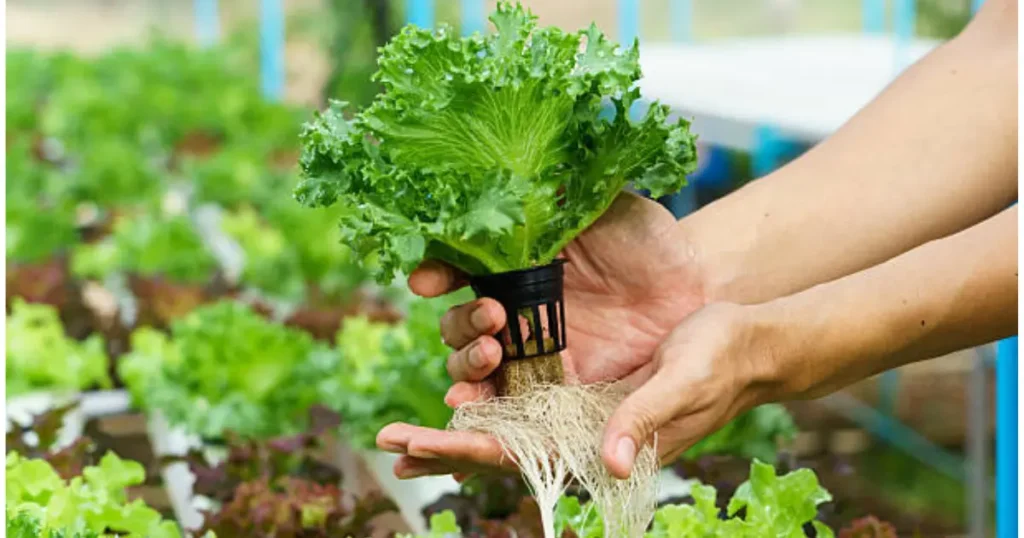Water Saving Hydroponics : The Brilliant Farming Revolution
Table of Contents
ToggleIntroduction
Water is one of the most crucial resources for agriculture, yet traditional farming methods often lead to excessive water consumption and wastage. As the global population continues to grow, there is an increasing need for sustainable agricultural practices that optimize water use. One such innovative method is hydroponics, a soil-less farming technique that significantly reduces water consumption while increasing crop yield. This article explores how hydroponics saves water while growing more food, making it an excellent solution for sustainable agriculture.
Understanding Hydroponics
Hydroponics is a method of growing plants without soil by using a nutrient-rich water solution. Instead of relying on soil to provide essential nutrients, plants receive them directly from the water, which enhances their growth rate and efficiency. There are several types of hydroponic systems, including deep water culture, nutrient film technique (NFT), aeroponics, and drip systems, all of which contribute to improved water efficiency.
The Water-Saving Benefits of Hydroponics
Reduced Water Usage
.
Traditional farming methods require substantial amounts of water for irrigation. However, hydroponics uses up to 90% less water than conventional soil-based farming. In hydroponic systems, water is recirculated, minimizing waste and ensuring plants receive an optimal amount of hydration. This makes hydroponics a highly water-efficient agricultural practice.
Minimization of Evaporation
.
In conventional farming, a significant amount of water is lost due to evaporation, especially in hot and arid regions. Hydroponic systems are designed to reduce evaporation by using covered or enclosed environments, ensuring that water is utilized more effectively. This further enhances water savings and makes hydroponics a sustainable option for food production.
Elimination of Soil Absorption Losses
.
In traditional farming, a large portion of irrigation water is absorbed by the soil rather than being utilized by plants. In hydroponic systems, water is delivered directly to plant roots, ensuring that nearly every drop is used efficiently. This targeted approach leads to substantial water savings and maximized plant growth.
Water Recycling and Reuse
.
One of the biggest advantages of hydroponics is its ability to recycle water. Unlike conventional farming, where excess water drains away and is lost, hydroponic systems capture and reuse water. This closed-loop system minimizes water wastage, making hydroponics an eco-friendly farming solution.
Prevention of Water Runoff and Pollution
.
Traditional farming often leads to nutrient-rich water runoff, which can contaminate local water sources and contribute to environmental degradation. Hydroponics prevents this issue by maintaining a controlled system where water is continuously recycled. This not only conserves water but also reduces pollution, making hydroponics a responsible choice for sustainable agriculture.
Higher Yield with Less Water
In areas where water is scarce, hydroponics offers a viable solution for food production. Countries facing droughts and water shortages can adopt hydroponic farming to grow crops efficiently without depleting their limited water resources. The ability to cultivate food in controlled environments, such as greenhouses or indoor farms, further ensures a reliable food supply in regions with unpredictable rainfall.
Hydroponics as a Solution for Water-Scarce Regions
Hydroponics not only saves water but also produces higher crop yields compared to traditional farming. Plants grown in hydroponic systems receive optimal nutrients directly from the water, allowing them to grow faster and healthier. Additionally, the controlled environment eliminates competition for water and nutrients, leading to increased productivity. Some studies have shown that hydroponic farming can yield up to 30-50% more produce than conventional farming while using significantly less water.
Environmental and Economic Benefits
Hydroponics not only conserves water but also has several environmental and economic benefits:
-
Bacteria: The Remarkable Role of Microbes for Growing Plants in Hydroponics
-
Hydroponics: The Rookie Mistakes of Growing Plants
-
Chlorine: The Incredible Key to Thriving Hydroponic Plants
-
Molybdenum: Astonishing Importance for Hydroponic Plant Growth
-
Boron: The Astonishing Importance for Plants Growing in Hydroponics
-
Copper: A Powerful Element for Hydroponic Plant Growth
-
Zinc: The Powerful Secret to Hydroponic Plant Growth
-
Manganese: Essential role for Hydroponic Plant Growth
-
Iron: The Crucial Role of Iron in Hydroponic Plant Growth
-
Sulfur: The Vital Key to Thriving Hydroponic Plant Growth
-
Magnesium: The Crucial Role for Thriving Hydroponic Plants
-
Calcium: The Critical Importance for Thriving Hydroponic Plants
Reduction in Land Use
Hydroponics requires less space than traditional farming, making it ideal for urban agriculture.
Lower Dependency on Chemical Fertilizers
Nutrient solutions in hydroponic systems are precisely balanced, reducing the need for excessive fertilizers.
Decreased Pesticide Use
Controlled environments in hydroponic farms reduce pest infestations, minimizing the need for harmful pesticides.
Faster Crop Growth
Since plants receive nutrients directly, their growth cycles are shorter, allowing for multiple harvests within a year.
Conclusion
Hydroponics is a revolutionary farming method that addresses the growing need for water-saving agricultural practices. By significantly reducing water consumption, minimizing waste, and increasing crop yield, hydroponics proves to be a sustainable and efficient alternative to traditional farming. As water scarcity becomes a pressing global concern, adopting hydroponic farming can help secure food production while conserving one of our planet’s most precious resources. Embracing hydroponics today will ensure a more sustainable and food-secure future for generations to come.

